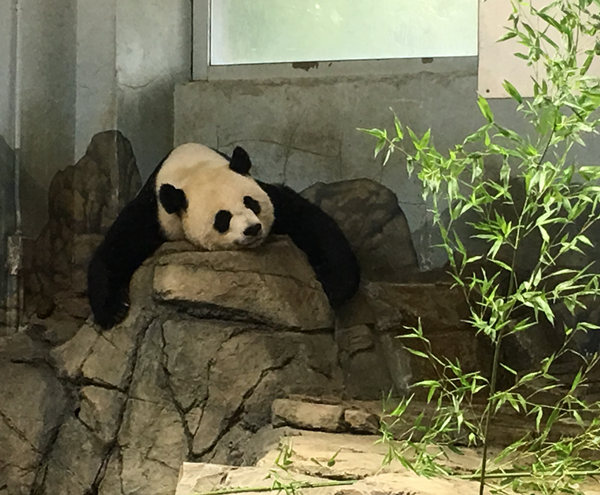DC's giant panda fans could be in for a surprise
 |
|
Giant panda Mei Xiang at the National Zoo in Washington takes a nap on Sunday morning. Chen Weihua/China Daily |
Giant panda cubs often steal the spotlight at the Smithsonian National Zoo in Washington, such as the departure of female cub Bao Bao on Feb 21 and the weaning of male cub Bei Bei a few weeks later. All eyes have now turned once again to their mother Mei Xiang, who turned 19 on Saturday.
Mei Xiang, meaning beautiful fragrance in Chinese, was treated to a frozen cake that morning. She was born on July 22, 1998, at China Conservation and Research Cener for the Giant Panda in Wolong, Sichuan province. Her parents, mother Xue Xue and father Lin Nan, were both born in the wild. She came to the National Zoo in 2000 with male panda Tian Tian, who will turn 20 on Aug 27.
But before celebrating Tian Tian's birthday, the zoo might have some other big news to announce, again about Mei Xiang, who was artificially inseminated on May 25 after the zoo biologists found her estrogen levels peaked on May 24, an indication that she was ovulating and able to become pregnant. Female giant pandas are only in estrus, or able to become pregnant, for a 24-to-72-hour window once a year, according to the zoo.
Mei Xiang was artificially inseminated with semen from Tian Tian. Li Rengui of the China Conservation and Research Center for the Giant Panda was at the zoo for the procedure.
The zoo received approval for the breeding plans from the China Wildlife and Conservation Association and the US Fish and Wildlife Service, both of which monitor giant panda research programs in the US.
"Right now, Mei Xiang is her normal self," Laurie Thompson, assistant curator of giant pandas, said on Friday in a posting on the zoo's website.
"She's doing her normal routine — like the other pandas — where she's going out and napping, eating, and doing her thing."
On Sunday morning around 11am, Mei Xiang was seen napping on a rocker, her limbs fully stretched out.
The zoo said her behavior will change toward the end of the summer and early autumn as she will become less interested in going outside and prefer to spend most of her time building a nest for her new cub (or cubs?).
Her appetite will eventually drop off and she will stop going outside all together. During that time, Mei Xiang will continue to be responsive but will no longer pay much attention to the outside world. "She's in her own world and spends a lot of time in her den," Thompson said.
This phase could end in a few possible ways, according to the zoo, including the birth of a cub; a miscarriage; reabsorption; or false pregnancy.
Reabsorption, as described by the zoo, happens when food and blood supply to the fetus is stopped, the placenta becomes useless and the fetus, having very little bone content, is simply reabsorbed into the female's body.
The female panda can also exhibit all signs and symptoms of a pregnancy despite not being pregnant. Giant panda pregnancies and false pregnancies, or pseudo-pregnancies, generally last between three to six months.
According to the zoo, the only way for veterinarians to determine if Mei Xiang is pregnant is to see a fetus through ultrasound, because her hormones and behavior will mimic a pregnancy even if she is experiencing a false one.
Mei Xiang has given birth to six cubs at the National Zoo, all fathered by Tian Tian. Only three have survived: Tai Shan, a male, was born on July 9, 2005 and moved to China on Feb 4, 2010, to join the breeding program under the agreement between China and the US; Bao Bao, who was born on Aug 23, 2013 and moved to China in February; and Bei Bei, the current male cub at the zoo, who was born on Aug 22, 2015.
A total of 1,864 giant pandas live in the wild today, according to the World Wildlife Fund. Last year, the International Union for Conservation of Nature changed the giant panda's status from "endangered" to "vulnerable" thanks to the increase in their numbers due to extensive conservation efforts.
Contact the writer at chenweihua@chinadailyusa.com.
















